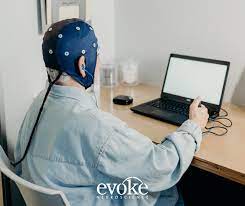Unlocking Cognitive Disorders
Cognitive disorders, encompassing a spectrum of conditions that disrupt thinking, communication, and memory, pose intricate diagnostic challenges. From mild forgetfulness to profound cognitive impairment, these disorders manifest in various ways, making accurate diagnosis essential for effective treatment by Evoke Neuroscience .
The Complex Landscape of Cognitive Disorders
The causes of cognitive disorders are diverse and multifaceted. For instance, Alzheimer’s disease stems from abnormal protein deposits in the brain, while dementia can result from brain injuries, strokes, drug interactions, or genetic predispositions. These conditions lack clear-cut symptom sets, complicating the diagnostic process.
Current Diagnostic Methods
Presently, the diagnosis of cognitive disorders primarily relies on the clinical acumen of healthcare professionals. Doctors gather insights from patient observations, self-reported symptoms, and medical histories to piece together the diagnostic puzzle. However, this subjective approach can sometimes result in incomplete or inaccurate diagnoses.
The Innovative Power of EEG Subcategorization
Enter EEG subcategorization—an innovative diagnostic tool that holds the potential to revolutionize the diagnosis of cognitive disorders. EEG subcategorization leverages computer programs to analyze brainwave patterns, categorizing them into distinct types of epilepsy. While initially designed for epilepsy, it has shown great promise in enhancing the diagnosis of cognitive disorders.
Enhanced Diagnoses through EEG Subcategorization
The deployment of EEG subcategorization by Evoke Neuroscience has yielded remarkable results. By scrutinizing EEG readings, doctors gain access to a trove of invaluable data and context. This data-driven approach enables more precise, comprehensive, and accurate diagnoses of cognitive disorders.
EEG subcategorization assists healthcare professionals in identifying intricate patterns within patients’ brain activity that may have previously eluded detection. This newfound clarity empowers doctors to provide tailored treatments based on a deeper understanding of the neurological factors contributing to cognitive disorders.
A Holistic Approach to Treatment
The significance of EEG subcategorization extends beyond accurate diagnoses. By identifying potential contributing factors, it enables doctors and researchers to adopt a more comprehensive and holistic approach to treatment. This approach prioritizes the treatment of any other factors that may be influencing symptoms before investigating neurological causes, thereby enhancing treatment efficacy.
In conclusion, EEG subcategorization by Evoke Neuroscience represents a promising advancement in the field of cognitive disorder diagnosis. This innovative tool empowers healthcare professionals to make more informed, precise, and complete diagnoses, ultimately improving patient care and outcomes. As we continue to unlock the mysteries of cognitive disorders, EEG subcategorization shines as a beacon of hope for enhanced diagnostic accuracy and tailored treatment strategies.
